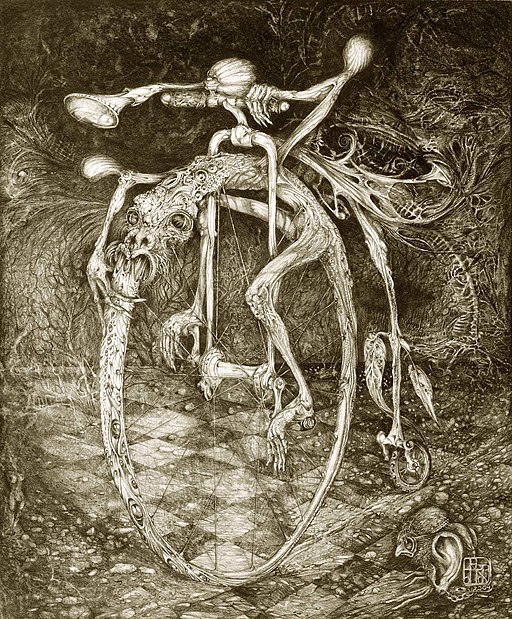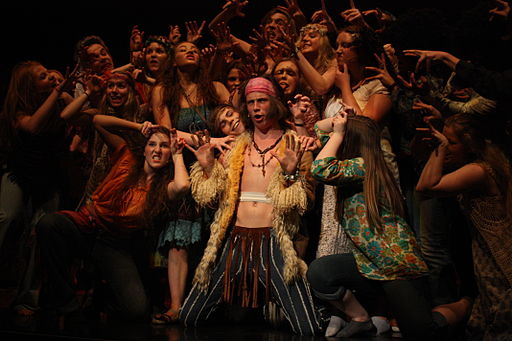
Ouroboros Perpetual Motion Machine Author & Copyright holder Otto Rapp and Martin Wallnberger Creative Commons Attribution-Share Alike 4.0 International license.
William Roper: “So, now you give the Devil the benefit of law!”
Sir Thomas More: “Yes! What would you do? Cut a great road through the law to get after the Devil?”
William Roper: “Yes, I’d cut down every law in England to do that!”
Sir Thomas More: “Oh? And when the last law was down, and the Devil turned ‘round on you, where would you hide, Roper, the laws all being flat? This country is planted thick with laws, from coast to coast, Man’s laws, not God’s! And if you cut them down, and you’re just the man to do it, do you really think you could stand upright in the winds that would blow then? Yes, I’d give the Devil benefit of law, for my own safety’s sake!”
―Robert Bolt, A Man for All Seasons
To Turn from War to Peace the Hegelian Dialectic must be dismantled
Today’s American empire was established in the post-WWII era with the U.S. acting as “receiver” for British mercantile interests. Along with its corporate elites and imperial mandate, the U.S. inherited a 19th century European worldview referred to as the Hegelian Dialectic, which is based on the belief that conflict creates history. The dialectic derived from German philosopher Georg Hegel’s critique of natural law, written in 1825, in which he posited a theory of social and historical evolution. Hegel’s new manner of thinking with its Thesis – Antithesis – Synthesis revolutionized thought and served as a tool for a new breed of social engineer eager to overthrow the old world order. Hegel’s dialectics acted as the foundation for the communist economic theories of Karl Marx and Frederick Engels. In essence, Hegel disputed the theory of universal natural rights espoused by other philosophers such as Immanuel Kant, thereby laying the foundations for totalitarianism. According to Hegel, human society could only achieve its highest state and mankind its highest spiritual consciousness through endless self-perpetuating ideological struggles and conflicts between bipolar extremes. This conflict of opposites when applied to social, political and economic systems would result in the synthesizing of opposites which would inevitably lead mankind to final perfection.
Evidence of the invisible dialectic controlling the daily narrative can be found everywhere: Environmentalists against private property owners, democrats against republicans, communists against capitalists, pro-choice versus pro-life, Christians against Muslims. No matter what the issue, the invisible dialectic controls both the conflict and the resolution yet it now seems that Hegel’s progress toward perfection has led only to new and more deadly cycles of conflict. The Hegelian dialectic works as a powerful tool for legitimizing whatever dialogue advances the global elite’s interest and looking back over the past 100 years, it is almost impossible not to see how its deliberate use has created a corrupted synthesis of state power. At a micro-level, this phenomenon can be observed now taking over America’s politics.
Today’s Hegelians claim that their objective is to create a more egalitarian society. But in practice they merely manipulate and subvert the existing order with the ultimate goal of a utopian world government i.e. “New World Order” which they themselves will rule. The system of designed social conflict to break down individual rights was spelled out by Hegel himself when he said: “‘…the State’ has the supreme right against the individual, whose supreme duty is to be a member of the State… for the right of the world spirit is above all special privileges.”
By this definition, state power requires the rule of law, minimal corruption, judicial independence and state monopoly over the means of coercion; as well as a political culture of some trust and compromise rather than distrust and conflict. But when the state’s monopoly on coercion ultimately leads to distrust and conflict, then Hegel’s method has reached a contradiction which it cannot escape. When democracies cling to legitimacy based solely on the use of coercion on its own citizens, they are no longer democracies but a fascist/totalitarian state.
Economist and historian Antony Sutton belittled the Hegelian method by writing that at its best, “the Hegelian doctrine simply replaces the divine right of kings with the divine right of states.” So, based on America’s failures in Afghanistan and Iraq, the tumult in the Greater Middle East and now in Eastern Europe, has the Hegelian dialectic run its course? The American empire is at a turning point politically, economically and socially. The Hegelian dialectic of endless conflict and competition has proved ruinous to the health of Western civilization. Will its course lead to a synthesis of its best elements or into a further disintegration of what has traditionally been known of as society?
The only way to defeat the downward progression of Hegel’s hypothesis is to step outside the dialectic and free ourselves from the limitations of controlled and guided thought. By moving away from a reliance on the monopoly of coercion and reaffirming our belief in the natural rights of all humans, we will return the foundations of legitimacy to the American government. Sutton frames the Hegelian dialectic as against the spirit and letter of the Constitution of the United States by stating how “We the people” grant the state some powers and reserve all others to the people and not self-appointed elites running the State.
If Americans truly believe the rights of the state are always subordinate and subject to the will of the people and consent of the governed, and truly believe that all people are endowed with inalienable rights and are created equal, then the time has come to reevaluate the dialectic and return to our time-worn natural rights.

A 2011 production of HAIR; the 1968 Anti-Vietnam War American Tribal Love-Rock Musical (Image by GisleHaa)
The West can be restored, but only if Westerners rediscover their individual human right to those principles and traditions they claim to uphold. It is time for Western leaders to understand that the dialectic, which demands perpetual conflict, is a losing cause that has become self-defeating wherever applied. Ultimately it can only lead to self-annihilation. It is critical to establish a new and positive narrative for the American people. This is a key point in our effort to resurrect President John Fitzgerald Kennedy’s dream of world peace based on his American University speech, a blueprint for the creation of an action plan. That effort will culminate in a revival of something like the American Tribal Love-Rock Musical HAIR. In its time HAIR was the center of the Anti-Vietnam War Movement delivering a riveting political and social awakening that we experienced personally back in 1970. Its impact still reverberates around the world today. We are putting the power of that experience to work transforming today’s toxic international scene into a movement to bring about positive change that all people around the world desperately need and want. Our effort towards peace through dialogue and music will help us all break free from the dialectic’s narrative of defeating the “other” and opening to a more complex self-aware perspective where Americans can function as the spiritual and moral gauge in which one’s own values will be tested.
As difficult as it may be for Westerners to grasp, the West’s future lies in a process of re-humanization so it can address its own identity crisis. To quote from world renowned philosopher Marshall McLuhan: “… we’re standing on the threshold of a liberating and exhilarating world in which the human tribe can become truly one family and man’s consciousness can be freed from the shackles of mechanical culture and enabled to roam the cosmos. I have a deep and abiding belief in man’s potential to grow and learn, to plumb the depths of his own being and to learn the secret songs that orchestrate the universe. We live in a transitional era of profound pain and tragic identity quest, but the agony of our age is the labor pain of rebirth.”
We believe our future can be built based on JFK’s Dream of World Peace. Doing so will promote the rights of all people around the world to move away from War to the genuine Peace following its phenomenally long absence as a new standard for the West.
Copyright © 2022 Fitzgerald & Gould All rights reserved